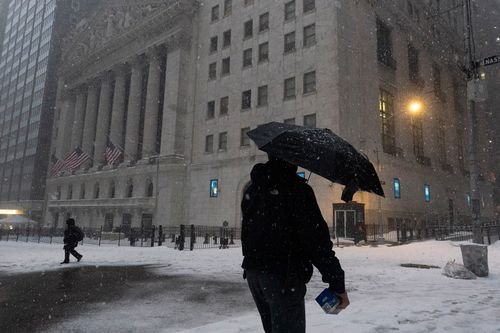Hedge funds are getting crushed by the worst short squeeze in a quarter century

Hedge funds that bet against GameStop and other stocks have been crushed by the Reddit army — and they’re infecting the rest of Wall Street.
The most heavily shorted stocks have nearly doubled in value over the last three months, according to Goldman Sachs. Those staggering gains created distress for short-sellers, setting off a negative spiral in the broader markets.
“The past 25 years have witnessed a number of sharp short squeezes in the US equity market,” Goldman Sachs strategists wrote in a note published Monday, “but none as extreme as has occurred recently.”
For context, the most heavily shorted stocks with market values above $1 billion rose by a more modest 77% during the second quarter of last year. The current short squeeze also exceeds the 56% rally for those stocks toward the end of the Great Recession and similar ones during the dotcom bubble.
A mob of traders on Reddit’s WallStreetBets page have sent GameStop, AMC and other stocks skyrocketing in recent days. GameStop lost a quarter of its value Monday but it’s still up nearly 1,200% on the year.
WallStreetBets successfully triggered an epic short squeeze, where investors that bet against GameStop have been forced to unwind their bets and buy the stock back. That in turn has driven GameStop even higher, creating even more losses for short-sellers.
Melvin Capital, a hedge fund that bet heavily against GameStop, lost a stunning 53% of its value in January. The hedge fund eventually had to get bailed out by Citadel and Point72, two hedge funds that provided a $2.75 billion lifeline.
The enormous losses for hedge funds and other short-sellers spilled over into the broader markets last week. The S&P 500 suffered its worst week since October — and some analysts at least partially blamed the Reddit-fueled mayhem.
Negative feedback loop
Here’s why: Hedge funds that bet against GameStop and other Reddit-favored stocks were forced to take steps to counter their losses. Some faced margin calls, requests to put up more capital when positions weaken. To raise cash, they had to sell completely unrelated but highly liquid stocks such as Apple and Amazon. And that in turn caused other investors to take chips off the table, continuing the negative feedback loop.
“This week demonstrated that unsustainable excess in one small part of the market has the potential to tip a row of dominoes and created broader market turmoil,” Goldman Sachs strategists wrote in the note.
Not surprisingly, US stocks bounced back Monday as GameStop tumbled. The S&P 500 rallied 1.6%, its best one-day gain since November. The same pattern was playing out during premarket trading Tuesday.
Goldman’s prime services arm, which caters to hedge funds, said that last week represented the largest active hedge fund de-grossing since February 2009 during the Great Recession. De-grossing means hedge funds unwound their positions — by closing out a bet against GameStop or by selling shares of a company like Alphabet, for example.
Despite those moves, Goldman Sachs said that hedge fund net and gross exposures remain close to record highs, “indicating ongoing risk of positioning-driven selloffs.”
Charlie McElligott, managing director at Nomura Securities, called last week a “crowding gross down shock” and warned that based on volatility metrics, more selling could be ahead.
More euphoric than 2000 dotcom bubble
However, Goldman Sachs strategists remain bullish on the stock market, reiterating its prediction that the S&P 500 will end the year at 4,300. That would translate to an 14% gain from Monday’s close.
The performance of the stock market after short squeezes tends to be dictated by the economy. When the pace of growth was improving, the S&P 500 tended to perform well during the month after short squeezes, according to Goldman Sachs.
“If growth remains the key driver of stock prices, investors have reason for optimism,” Goldman Sachs strategists wrote.
Others are concerned about how GameStop mania is another example of speculative excess in overly exuberant financial markets. From the red-hot IPO market to SPAC mania, evidence of bubble-like behavior is mounting.
Citigroup’s Panic/Euphoria Model of market sentiment has been signaling caution since November. However, more recently this closely watched gauge has climbed above even the levels of early 2000 during the dotcom bubble, a “particularly troubling” development, Citigroup chief US equity strategist Tobias Levkovich warned clients in a note Monday.
“We believe that too many investors are complacent and worry more about market rallies than pullbacks,” Levkovich wrote.